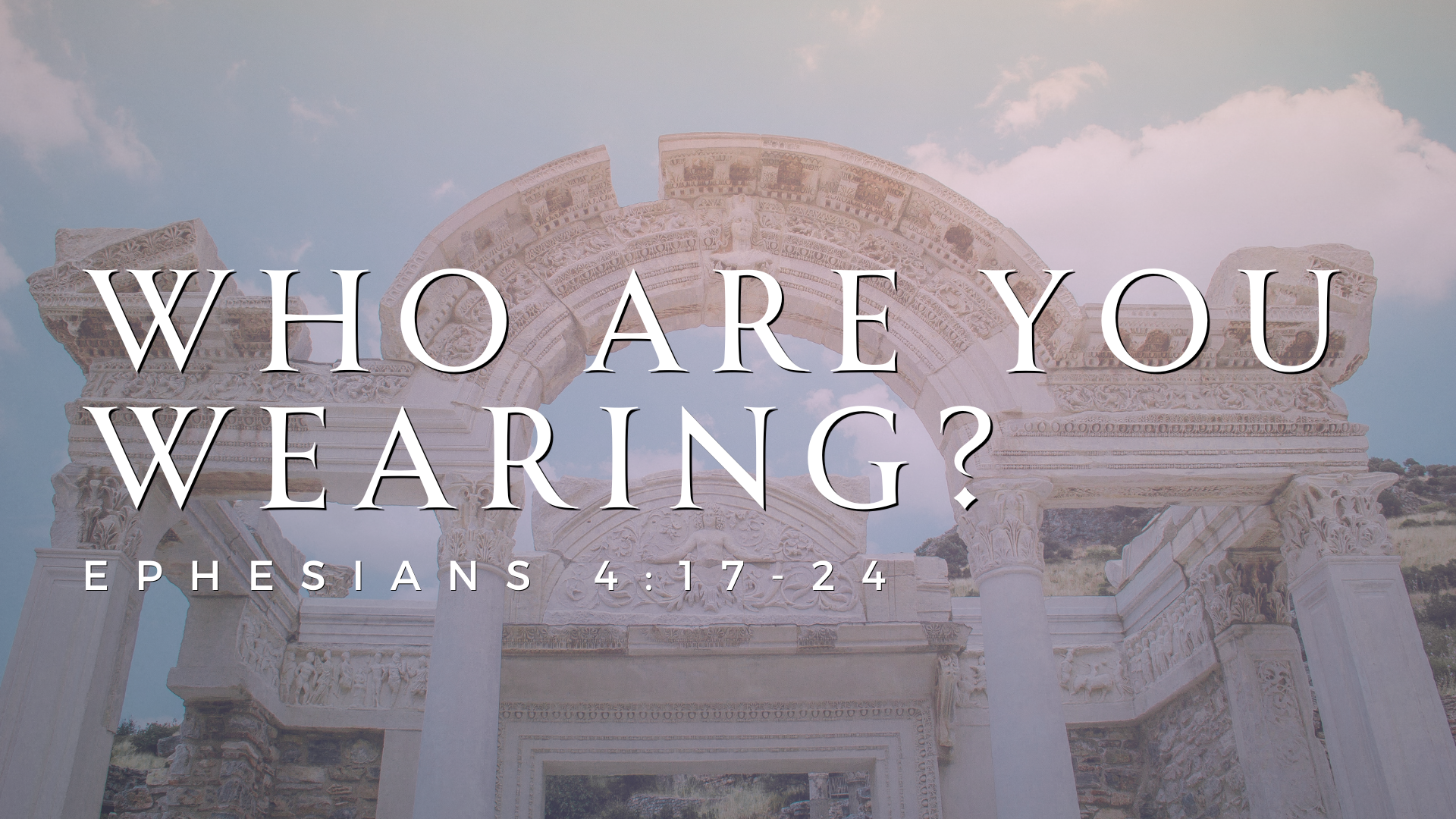
Who Are You Wearing? (Ephesians 4:17-24)
Ephesians 4:17-24 – 17 Therefore, I say this and testify in the Lord: You should no longer walk as the Gentiles do, in the futility of their thoughts. 18 They are darkened in their understanding, excluded from the life of God, because of the ignorance that is in them and because of the hardness of their hearts. 19 They became callous and gave themselves over to promiscuity for the practice of every kind of impurity with a desire for more and more.
20 But that is not how you came to know Christ, 21 assuming you heard about him and were taught by him, as the truth is in Jesus, 22 to take off your former way of life, the old self that is corrupted by deceitful desires, 23 to be renewed in the spirit of your minds, 24 and to put on, the new self, the one created according to God’s likeness in righteousness and purity of the truth.
Who are you wearing?
Back when people watched awards shows that’s the question celebrities would be asked as they walked the red carpet. Joan Rivers, the controversial comedienne, delighted in exposing who she thought was the worst dressed.
At the 1997 Golden Globes, Joan declared Helen Mirren to be the worst dressed. She looked into the camera and said, “Helen, get your act together. You’ve got to start dressing better.” A few weeks later, Helen watched the replay of the show. After hearing Joan’s pronouncement, she burst into tears.
Who are you wearing? That’s the question Paul puts to us tonight in Ephesians 4. And it’s not just a hypothetical, it demands an answer. Kyle Snodgrass writes, “The letter reaches a climax here. Paul’s readers cannot go further without making an ethical decision…The rest of the letter will only take care of details.”
By the end, we’re left with no excuse, only choice: To put on the new man God has made us to be or to go back to the ruined rags of sin. To wear one of two garments and walk one of two paths.
Ephesians 4:17 – 17 Therefore, I say this and testify in the Lord: You should no longer walk as the Gentiles do, in the futility of their thoughts.
After chapters of overflowing excitement – piles of blessings, prayers of thanksgiving, songs of praise, we sense a change in Paul’s tone. There’s a forcefulness and formality in his opening phrase. The word testify “is a solemn term, often used to put people on notice that they must carry out a particular behavior or serious consequences will follow.”
Paul’s words here are a command and a warning. A warning to who? To you! Who, me? Yes, you! You Christian. You faithful saint. You should no longer walk as the Gentiles do. Now, your text might read “as the rest of the Gentiles do,” but that’s not in the original.
It’s easy to remove ourselves and think, “Well, of course, the Romans were crazy. They were pagans who did all sorts of weird things.” And, it’s true – they did. But we cannot honestly say that our culture – our nation – is in submission to God or pursuing Him. We can’t say our culture isn’t sexually immoral, full of greed and selfishness and willful ignorance. In fact, you could read it this way: “You should no longer walk as the Americans do.” It stings a little more when we hear it that way, right? But that’s how the original audience would have heard it.
Paul has nothing kind to say about their former way of life. He says we need to leave it behind. He’s back to this analogy of walking that he started in verse 1. Don’t walk as the Gentiles do so that you can walk worthy with the Lord. Paul insists on it. It’s not a suggestion, it’s not negotiable.
The problem is, walking like a Gentile is natural. We’re incentivized from all sides to go the world’s way. But by the end of our text, we’ll see what a waste, what a ruin, what a dead end that way is.
It’s not just about sinful activities. The problem starts within, in the futility of their thoughts. Paul is talking abut mindset and mentality and attitudes and ways of thinking and identity. And he says the Gentile way, the American way, the ungodly way, is worthless and empty. It warps the mind and then behavior and customs and culture follows.
Ephesians 4:18 – 18 They are darkened in their understanding, excluded from the life of God, because of the ignorance that is in them and because of the hardness of their hearts.
Futile. Darkened. Excluded. Ignorant. Hard-hearted. Tell me how you really feel, Paul! But this isn’t just Paul’s opinion – he’s testifying on the Lord’s behalf, writing under the inspiration of God the Holy Spirit. This is God’s assessment of human culture. This is a revelation of what is true.
This is what sin has done to the human mind. We read all about it in Romans 1, where mankind refuses to acknowledge God, they refuse to accept His truth and go His way, instead they want to go this other way, and here is the result. They are given over to the ruin of sin.
If I’m in the dark and I see a light in the distance, I have a choice. I can head toward that light, and as I do, more and more will be illuminated around me. Or I can turn my back on the light and head further into the dark, more and more at danger, more and more aimless, more and more unable to make any meaningful progress. That’s what happens when we don’t go God’s way. And the longer a person embraces that spiritual ignorance, the more insensitive they become to the Lord.
So now, pause. Most of us are believers here tonight. We want to follow God. We trust His Word. We’re doing what Paul tells us we should do. We’re not walking the Gentile way. But, if we’re honest, sometimes we take a detour to get input from the world. We have questions or difficulties and we’re tempted to think, “What do the world’s experts suggest I do with my money or in my marriage or in my parenting or for my future?” But the Lord says they are darkened in their understanding. The blind leading the blind.
Ephesians 4:19 – 19 They became callous and gave themselves over to promiscuity for the practice of every kind of impurity with a desire for more and more.
Callous is a term that refers to petrification or the kind of skin that grows over a severe burn that is less sensitive than before. It means to abandon your sense of pain.
The idea is that the natural man goes to sin like a child to a hot oven and is burned. But then, he doesn’t heed the warnings. And so, once his skin heals, he grabs the oven again and again and again, causing more and more damage to himself but being less and less sensitive to it. In 1 Timothy 4, Paul says our consciences can become seared when we don’t walk with God.
Now, Paul is generally referencing inappropriate sexual behavior in this verse, but promiscuity expands to all sorts of unrestrained immoral attitudes and behaviors. One source defines it as, “The determination to gratify self-interest at all costs.” It’s not just about sex, it’s about greed and selfishness, and rebellion against God.
Sexual immorality, greed, and impurity shouldn’t even be heard of among Christians. From the Bible’s perspective, there is a huge gulf between the life of sin and the life of Christ. But the problem is that we dabble. We make little pitstops for impulse buys of sin.
We do so because we’re tempted and sin makes promises to us and feels enjoyable for a time. But what is the truth about sin? What is the truth about walking the way of the world?
First: Indulging sin will never, ever satisfy. The sin nature always demands more and and more. We convince ourselves that a little taste is all we need, but it’s a trap.
Second: When we indulge in sin, we are ignoring God’s warnings about it. This is what happened in the Garden of Eden, and this is exactly what Paul is talking about. God says this is a dark poison leading to ruin and failure and disaster. We say, “but it feels good…” When we give into temptation it is our hearts rebelling – saying to God, “I don’t believe You.”
We’ve got the lollies in the cafe. If I told you, “The lollies are free, but they are laced with a little bit of anthrax.” If you believed me, that would change your attitude toward it. So temptation becomes an issue of faith. Do we believe what God has said or do we disbelieve Him?
The third thing we learn from Paul’s words is that moderation isn’t the answer. Look at the state of the natural man. Petrified. Ruined. Blind. Dead. We need a new nature – the one God supplies.
Ephesians 4:20-21 – 20 But that is not how you came to know Christ, 21 assuming you heard about him and were taught by him, as the truth is in Jesus,
Paul gives us encouragement here. The Gentile Christians he was talking to were promiscuous, greedy, impure, unbelievers before they were saved. But now they were new. Now they knew Christ. In a different letter he writes, “such were some of you, but you were washed, you were sanctified. You were removed from the path of death and invited across the gulf onto the path of life.” Paul says to the Ephesians, “Because you know Christ, you are no longer darkened, ignorant, and excluded – you’re illuminated, instructed, and included!” This is good news!
What does it mean to know Christ? It means we know the principles and the Person. When the Ephesians were first born again, they knew very little about the content of Christianity. They hadn’t learned all the doctrines and stories and prophecies. They would grow in that knowledge as they received teaching and studied God’s Word. Paul taught every day for 2 years the principles of faith.
But God also wants us to know the Person – to understand His heart, His way of thinking, His character and presence. If we think we know the principles but don’t know Person, then we don’t really know Christ. This was the problem of the Pharisees. They knew the Hebrew Bible. They had it memorized! But they didn’t know the heart of God. They didn’t know the Person.
How does an individual come to know Christ? They first hear of Him and then are taught by Him. How can they hear? Paul sets it before us in a series of questions in Romans 10:
Romans 10:14-15a – 14 How, then, can they call on him they have not believed in? And how can they believe without hearing about him? And how can they hear without a preacher? 15 And how can they preach unless they are sent?
We Christians do not only have the responsibility of living the Christian life, but also of inviting others into a life with Christ by the preaching of the Gospel. God has sent you to someone so that you can preach Christ to them by your words and actions and personal testimony.
As friends of Christ, we’re all invited to learn more and more about the Lord as we walk with Him. Learning more about the principles and plans revealed in the Scripture, and more about His Person as we live in His presence.
You who are married – you know a lot more about your spouse now than you did on your first date. If you’ve ever been in a band, you know that when you first start playing with other musicians, it can be a rickety experience. But as the songs play and the years roll by, you’re not only comfortable, you’re able to anticipate what your bandmates are going to do at a given moment.
God wants us to know and learn Christ in those sorts of relational ways. That, as we live out our Christianity, we are the kind of people who walk with God in a living way, where we know the stories and take steps of faith. Where we trust in His leading and also are so filled with the mind of Christ and an understanding of His character that we can anticipate how He would respond to a given situation or opportunity.
Paul describes this ongoing life of walking with God using clothing as an analogy in verse 22.
Ephesians 4:22 – 22 to take off your former way of life, the old self that is corrupted by deceitful desires,
Again, Paul is talking to you and me. We are called to move toward the light, to step toward God. It starts by acknowledging that we’re not just “a little influenced now and then” by the world, but that we have a corrupt, poisoned, deceitful sin nature called the old self and we are to strip it off and leave it behind.
Christianity means a total redefinition and reidentification in Christ. That old, sin nature is unsalvageable. It’s like the wreckage of the HMS Titanic at the bottom of the sea. We’re not to nurture it or cultivate it or be nostalgic for it. Paul says it’s something we want to be saved from. “Wretched man that I am, who will save me from this body of death?”
How do we take it off? It’s not just behavior modification, though as we walk with God our behaviors change. Our desires change. Our mentality changes. God gives us the power to take of the old self and instead walk worthy of our calling. That’s what Romans 7 and 8 are about. Paul says,
Romans 8:13 – 13 if you live according to the flesh, you are going to die. But if by the Spirit you put to death the deeds of the body, you will live.
The old self was crucified with Christ. We have the power to leave the Gentile way and walk with Him. It’s not a matter of if we can, but of if we will.
Ephesians 4:23-24 – 23 to be renewed in the spirit of your minds, 24 and to put on the new self, the one created according to God’s likeness in righteousness and purity of the truth.
Spiritual renewal, spiritual strength, a life full of the blessings of God and the power of God, a life making progress, begins in the heart and mind. And it begins with a choice to walk with God, to go His way, meaning we have to know His way – to familiarize ourselves with Who He is and what He has said and what His plans are. If the truth sets us free and empowers us and renews us, then we need to know what the truth is. And it’s given to us in the Word of God.
Note this: God doesn’t just want us to believe in Him. Even the demons believe and shudder! The question we each need to ask ourselves is: Do I walk with God? Am I putting on the new self?
In 2 Corinthians we’re told this is a process we go through day-by-day. Where we determine in our hearts to be what God has made us to be. You see, we don’t have to make it happen. God has already done it. He’s already supplied the garment. One commentator writes, “Our task is not to weave it but to wear it.”
In You’re A Good Man, Charlie Brown, we get a glimpse into Charlie’s closet. Inside we see his a multiples of his famous shirt, but in all sorts of colors. Red, blue, green, grey. After considering for a moment, he (naturally) goes with the yellow. The same old shirt he’s always worn. The Lord says we have a choice, day-by-day. Will we exhume the dead corpse of our old nature and wear it’s rotting skin, or will we put on the new self – the one created in the likeness of Christ Jesus? The one where we think like Him and talk like Him and love like Him and endure like Him and react like Him. The new self that is uncontaminated even though we live in a contaminated world.
We have a tendency to think that it’s too hard to do what Paul is saying. But it isn’t. God supplies the power. God supplies the direction. He illuminates and invigorates. He made the new nature and gives it to us. It’s not too hard, it’s a question of if we want to do it.
If we feel spiritually weak, could it be because we have weakened ourselves with continual coziness with the way of the Gentiles? This was the case for some of our brothers and sisters in the First Century. Living the Christian life isn’t too hard. Think about all we’ve learned to this point in Ephesians. The grace and the power and the predestination and the sanctification and the unstoppable work of God! It’s not too hard for us to walk worthy.
Paul told his dear friend Timothy, “Train yourself in godliness.” He told the Romans, “Put on the Lord Jesus Christ, and make no provision for the flesh to gratify its desires.”
If you hear these commands from the Lord and think, “It’s too hard,” then either the lying sin nature has convinced you of what is not true or you don’t fully understand what God has done for you. This is who God has made you to be. You are dead to sin if you’re alive in Christ. That doesn’t mean we will be perfect, but it isn’t too hard to walk with the Lord. You and I should no longer walk as the Gentiles do, as the Americans do, as the self-obsessed world does. Instead, we should wear Christ. Wrap ourselves in His truth and righteousness and be renewed, strengthened, illuminated, empowered day-by-day, becoming more and more like Him.








